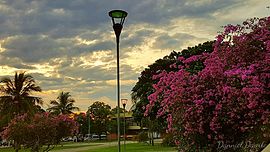Palmas
| Palmas | ||
|---|---|---|
|
Coordinates: 10 ° 12 ′ S , 48 ° 20 ′ W Palmas on the map of Tocantins
|
||
| Basic data | ||
| Country | Brazil | |
| State | Tocantins | |
| City foundation | May 20, 1989 | |
| Residents | 299,127 (estimate as of July 1, 2019) | |
| City insignia | ||
| Detailed data | ||
| surface | 2219 km 2 | |
| Population density | 100 people / km 2 | |
| height | 230 m | |
| Waters | Rio Tocantins | |
| Time zone | UTC −3 | |
| City Presidency | Cinthia Ribeiro , PSDB (2017–2020) | |
| Website | ||
Palmas , officially Portuguese Município de Palmas , is the capital of the Brazilian state of Tocantins .
Founded in 1990, it is the youngest of all Brazilian capitals. As of July 1, 2019, it had an estimated 299,127 inhabitants, the municipal area covers an area of around 2,219 square kilometers. Palmas is located on the Rio Tocantins at an altitude of 230 meters. The distance to the federal capital Brasília is around 1000 kilometers, the nearest large city Goiânia is almost 900 kilometers away.
Palmas has a hot and dry climate with an average annual temperature of 27 ° C, but in summer the temperature rises regularly to up to 40 ° C.
history
The department of the state of Tocantins of Goiás and the establishment of Palmas as the capital of the new state was decided in the context of a constitutional amendment in 1988.
The foundation stone for the city was laid on May 20, 1989. The municipal area for Palmas was separated from the municipalities of Porto Nacional and Taquarassu do Porto . The city was named after São João da Palma , the seat of an independence movement that had established itself in the area in the early 19th century, as well as the many palm trees that shape the image of nature around Palmas.
On January 1, 1990, the government bodies were moved from Miracema do Tocantins to Palmas, making Palmas capital.
In 2004 Raul Filho ( PT ) was elected mayor with 64.5 percent.
Archdiocese of Palma
economy
Palmas lives from the processing of the agricultural products that are produced in the area. The construction industry and trade are also important. There are subsidies for the settlement of companies. The port of Palmas serves as a transport hub to transport the products of the region to the consumers.
The city is trying to distinguish itself as an environmentally friendly city and to earn additional income in ecotourism . In fact, around Palmas there are several nature reserves, waterfalls in the jungle and beautiful river beaches.
The city is supplied with electricity by a specially built hydropower plant that is converting the former Rio Tocantins into a reservoir. However, because the infrastructure of the power grid is not perfectly developed, there are more power outages in individual city blocks of Palmas.
Web links
Individual evidence
- ↑ a b Palmas - Panorama. In: cidades.ibge.gov.br. IBGE , accessed August 31, 2019 (Brazilian Portuguese).
- ↑ Cinthia Ribeiro assume Prefeitura de Palmas e promete 'manter o ritmo'. In: globo.com. G1, accessed August 31, 2019 (Brazilian Portuguese).


